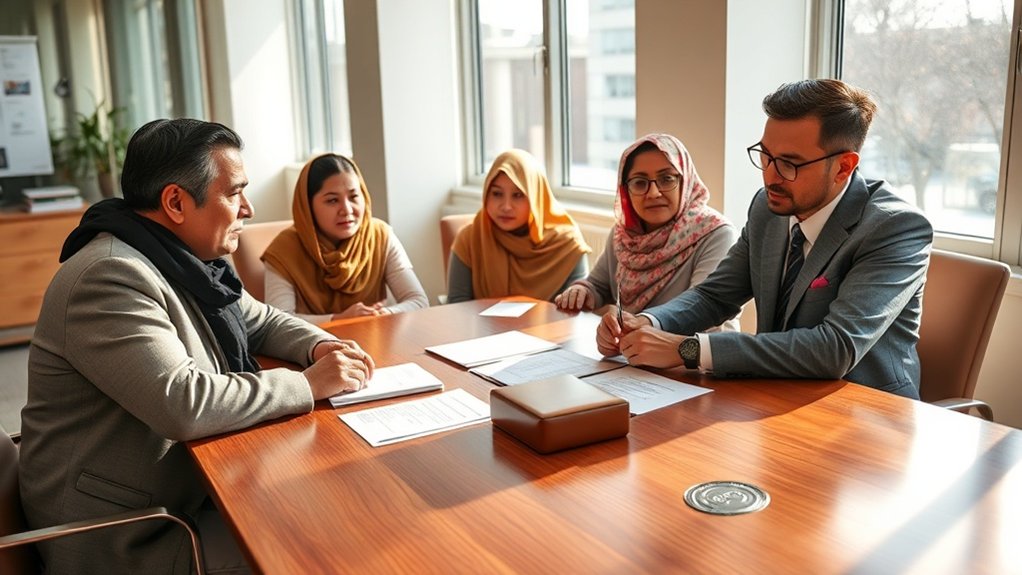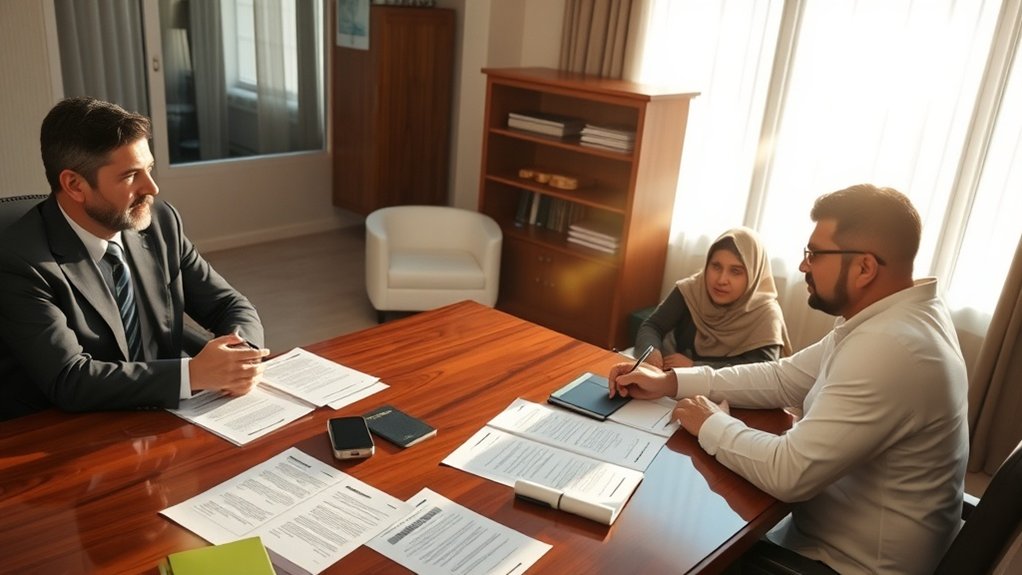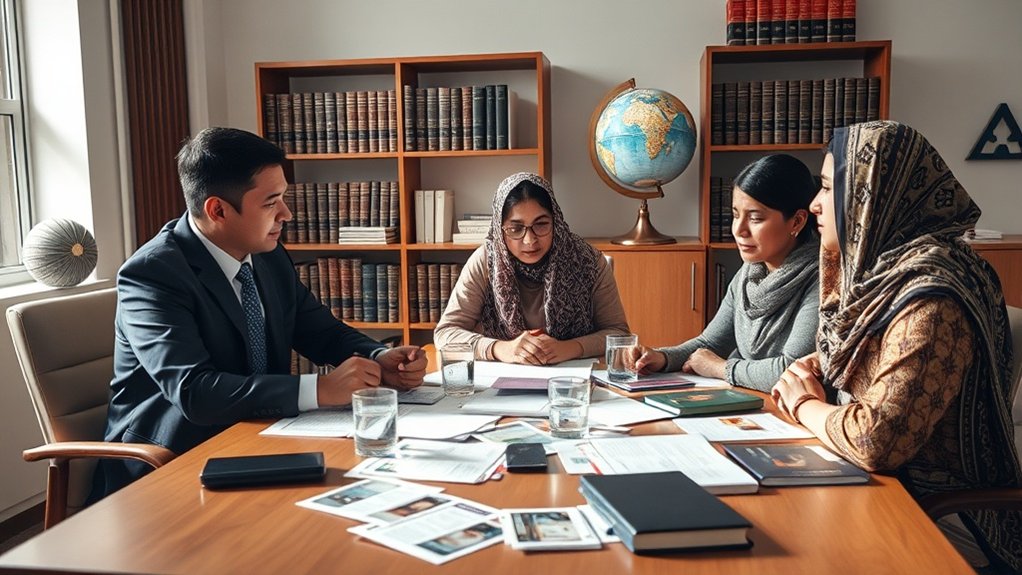If you’re an Afghan resident trying to secure social-assistance benefits, navigating the paperwork and regulations can quickly become overwhelming. Vieira Braga Advogados steps in to guide you through every stage, ensuring your documents are accurate and your chances of approval are much higher. Wondering how their approach can make the difference in your case or what strategies could ease your application process? There’s more you should know before making your move.
Understanding Social-Assistance Rights for Afghan Residents

Although settling into a new country presents many challenges, it’s important to understand the social-assistance rights available to Afghan residents. You’re entitled to certain benefits and support systems designed to help you adjust and provide for your basic needs. These rights may include access to healthcare, housing assistance, financial support, and educational programs. To access these services, you’ll often need to provide proof of your residency status and sometimes additional documentation, such as personal identification and family information.
Knowing your rights allows you to pursue assistance confidently, ensuring you and your family receive the support you deserve. If you’re unsure where to start, local government offices, community centers, or official websites can guide you about specific entitlements and the application process. Keep in mind, regulations might change, so it’s important to stay informed with up-to-date information relevant to Afghan residents in your area. Additionally, specialized legal support can help you navigate complex documentation requirements and avoid common mistakes throughout the immigration process.
The Role of Vieira Braga Advogados in Legal Advocacy
With extensive experience in supporting immigrant communities, Vieira Braga Advogados plays a key role in legal advocacy for Afghan residents seeking social assistance. They guide you through complex regulations, ensuring your rights are protected and your applications are complete. They listen closely to your situation and strategize your legal options, helping you feel confident in an unfamiliar system.
You’ll benefit from Vieira Braga Advogados’ tailored advice. Their lawyers stay updated with policy changes that affect your eligibility and benefits. If you face challenges like language barriers or document requests, you’ll have a trusted advisor to resolve them quickly.
When applying for crucial social benefits, it’s essential to understand the complexity of immigration laws to avoid mistakes or denials.
Here’s a visual overview of their key support areas:
| Support Area | What You Receive | Why It Matters |
|---|---|---|
| Guidance | Legal Interpretation | Fewer Mistakes |
| Representation | Advocacy at Agencies | Stronger Voice |
| Preparation | Document Review | Faster Processing |
With their expertise, you can navigate legal complexities confidently.
Key Documentation Needed for Social-Assistance Applications

When you apply for social assistance as an Afghan resident, you’ll need to provide proof of your residency, verify your identity, and submit evidence of your income. Each of these documents plays a crucial role in your application. Let’s look at what you’ll be asked for and how you can prepare these materials. Consulting with an immigration lawyer can help you ensure all essential documents are accurately prepared and increase the chances of a successful application.
Proof of Afghan Residency
Residency status stands at the core of your social-assistance application as Afghan documentation requirements are strict. You’ll need to prove you live in Afghanistan to meet eligibility criteria. Official residency documents, like a Tazkira (Afghan National ID) with correct address details, are most effective. If you don’t have a current Tazkira, alternative proof—such as a recent rental contract, utility bill, or government-issued correspondence showing your Afghan address—can support your claim. Ensure every document is up-to-date and matches your application information. Keep originals and copies organized, as authorities will thoroughly review them. If documents are in Dari or Pashto, include a certified translation. Fulfilling these proof-of-residency requirements will strengthen your social-assistance request and prevent avoidable processing delays. Seeking specialized legal support can help ensure that your files are correctly prepared, especially when dealing with complex immigration documentation and translation needs.
Identification Verification Process
After confirming where you live, it’s time to focus on proving your identity for social-assistance applications. You’ll need to provide documents that confirm who you are. Usually, the authorities will ask for a valid passport, a government-issued photo ID, or—if you’re an Afghan resident—an Afghan national ID or refugee identification card. Double-check that your documents are up to date and carry your full legal name, birth date, and a clear photograph.
If your original documents are unavailable, certified copies may suffice, but always verify with the relevant agency beforehand. Photocopies are typically not accepted unless verified by an authorized official. Keep these records safe and readily available, as you’ll likely need to show them during appointments or interviews with caseworkers handling your application. Having professional assistance from an immigration lawyer can help ensure your documentation and application process meets legal standards.
Income Evidence Requirements
To ensure fair distribution of assistance, authorities require you to provide clear evidence of your financial situation. When applying for social-assistance as an Afghan resident, you’ll need to gather documents that accurately reflect your earnings, sources of income, and any financial support you receive. This could include recent payslips, bank statements, employment contracts, or official letters verifying your salary or benefits.
If you’re unemployed, prepare to show unemployment confirmation letters or statements from support agencies. Self-employed applicants should present recent tax returns or registered business records. It’s important that these documents are current and official—outdated or incomplete information could delay your application. Double-check requirements with relevant agencies to ensure you submit everything necessary for a smooth, successful review of your social-assistance request.
For further support, professional assistance from an immigration lawyer can help ensure you organize and present all required documentation correctly, minimizing the risk of avoidable errors or delays.
Step-by-Step Guidance Through Application Processes

Whether you’re starting your application for Afghan residence or navigating social-assistance paperwork, understanding each step ahead of time will save you frustration. First, gather all necessary documents—proof of identity, financial information, and residence status. Double-check the specific requirements for your situation, as missing documents can delay the process. Next, fill out all forms clearly and truthfully. Many forms are now available online, making it easier to upload scans and track your application status.
If you’re unsure about a question or document, don’t hesitate to seek guidance. Legal professionals or assistance organizations can clarify confusing instructions and help you avoid common errors. As you move forward, keep copies of everything for your records. You’ll want to stay organized in case you need to resubmit any paperwork.
It’s important to note that specialized legal assistance throughout these processes can significantly increase your chances of approval and help you avoid delays or mistakes that might jeopardize your application.
Overcoming Common Documentation Challenges
You might face language barriers, trouble verifying your identity, or missing key documents when applying for social assistance. It’s important to know practical ways to handle these issues so your application isn’t delayed. Let’s look at how you can address each challenge with confidence. Getting help from specialized immigration consultancy can make it easier to understand complicated legal and bureaucratic steps, increasing your chances of a smooth process.
Although Afghanistan’s official languages are Dari and Pashto, social-assistance documents in host countries often appear only in unfamiliar languages, making the process of understanding and completing them especially difficult. If you can’t read or write the host country’s language, you might feel overwhelmed by forms, instructions, and official requests. This is a common hurdle, but you can find solutions by using resources and support already available.
- Seek out community organizations that offer translation or interpretation services for social-assistance paperwork.
- Use trusted online translation tools for initial understanding—though always double-check with a reliable human source.
- Bring a bilingual friend or community member with you to appointments to help explain details and answer questions.
If you’re trying to sort out documents for Brazilian immigration, it’s important to know that specialized immigration lawyer support can make a huge difference in avoiding errors and navigating paperwork successfully.
Verifying Identity Credentials
Because host countries often require specific forms of identification to access social assistance, Afghan residents may face unique obstacles if documents like passports, tazkiras, or birth certificates are missing, expired, or not recognized. You might discover that your identity credentials don’t align with local standards, creating confusion and delay in the approval process. Officials may not easily verify the authenticity of Afghan documents, especially if the issuing authority is no longer operational or if there are discrepancies in transliteration and personal details.
To move through these challenges, you’ll need to gather every available document, even if it’s not a perfect match. Prepare to answer questions and provide additional context about your identity and refugee status. This proactive approach helps bridge misunderstandings and demonstrates your commitment to compliance. Seeking help from an immigration lawyer can ensure your documentation is properly prepared and submitted, reducing the risk of further complications.
Addressing Document Gaps
How can Afghan residents navigate the reality of missing or incomplete documents when seeking social assistance? You might face document gaps due to emergency departures, lost records, or administrative delays. Don’t worry—there are practical steps you can take to address these challenges and keep your path to assistance on track. Authorities and organizations often accept alternative forms of verification or grant temporary statuses. Here’s how you can tackle common documentation problems:
- Request official letters from Afghan consulates or embassies confirming your situation or identity.
- Gather secondary documents like school records, medical files, or community attestations to help prove your identity or residence.
- Contact advocacy groups familiar with Afghan immigration issues; they can help mediate with authorities and fill out required paperwork.
Stay proactive—solutions exist.
Language and Cultural Support for Afghan Clients
Why does effective social-assistance support hinge on understanding both language and culture? When you help Afghan clients, clear communication is essential. If someone doesn’t speak Portuguese or English fluently, important information about documentation or procedures can get lost. You need interpreters or bilingual staff, so nothing critical is misunderstood. But language alone isn’t enough—you must also respect cultural norms and sensitivities. Afghans may view authority, family roles, or paperwork differently than you’re used to. If you ignore these differences, clients might feel uneasy, hesitate to ask questions, or miss required steps.
When you approach each case with cultural awareness, you build trust, making your clients more likely to share concerns and collaborate. Active listening, patience, and culturally relevant examples help bridge gaps. This approach ensures clients understand the process and feel supported throughout, increasing the chances they’ll complete their social-assistance documentation correctly and confidently.
Tailored Strategies for Complex Legal Situations

When Afghan clients face particularly complex legal situations—such as unclear residency status, missing documents, or overlapping legal processes—you’ll need to adapt your support strategies. These challenges require a flexible and proactive approach. First, assess the client’s specific circumstances, taking into account both their immediate and long-term needs. Coordination with various government agencies and consulates can help you track down missing paperwork or confirm legal statuses. You should communicate with clarity, making sure clients understand each step and their potential options.
Consider implementing these practical strategies:
- Prioritize documentation review: Inspect all available paperwork, noting gaps and inconsistencies that could pose issues.
- Forge agency partnerships: Build contacts with key officials or agencies who can expedite document requests or clarify procedures.
- Create step-by-step action plans: Break down lengthy or confusing processes into manageable stages and set clear timeframes.
Your adaptable strategies can resolve even the toughest legal challenges for Afghan residents.
Building Trust Through Client Success Stories
You build trust when you see real examples of clients overcoming legal barriers. These stories show you that successful outcomes are possible, even in tough situations. Let’s look at how hearing about real successes can empower you on your own journey.
Empowering Through Real Cases
Although the process of securing social-assistance documentation for Afghan residence can seem daunting, real-life stories of successful applicants offer reassurance and clarity. When you learn about others who’ve walked a similar path and reached positive outcomes, you gain the confidence to pursue your own goals. Vieira Braga Advogados has supported numerous Afghan clients in navigating paperwork, understanding eligibility, and advocating for their rights. Their experiences show that challenges can be overcome, and legal processes, while complex, aren’t insurmountable.
Consider how these clients benefited:
- Found tailored legal solutions that matched their needs and timelines.
- Received comprehensive guidance through every stage, minimizing mistakes.
- Gained peace of mind knowing experts were in their corner.
You can draw hope and motivation from these successes as you start your journey.
Overcoming Legal Barriers
Building on the confidence inspired by successful applicants, it’s important to recognize the specific legal obstacles Afghan residents often face. You may struggle with complex documentation requirements, language barriers, or unclear eligibility criteria. These hurdles can feel overwhelming, especially when you’re new to the system. By sharing real success stories, you see how others have navigated similar challenges, which helps you trust the process and your legal team.
When Vieira Braga Advogados steps in, their experience cuts through confusion and bureaucratic delays. They work with you to gather essential documents, clarify procedures, and advocate on your behalf. Each solved case reinforces your belief that these barriers aren’t insurmountable. You realize that with the right guidance, you can overcome legal challenges and secure the documentation you need.
Maintaining Up-to-Date Legal Knowledge

Staying current with evolving laws and policies is crucial when handling social-assistance documentation for Afghan residence. You can’t afford to miss changes that could impact the eligibility or requirements for your clients. Laws regarding refugee status, residency permits, and social benefits often shift, and falling behind puts at risk the success of any legal or administrative process. To maintain effective support, you need a practice of regularly updating your legal knowledge and understanding the direct impact of new rules on Afghan residents.
Use these strategies to keep your expertise sharp:
- Monitor official government sources for policy updates and regulatory changes.
- Attend professional legal seminars or webinars focused on immigration and social-assistance law.
- Network with other legal professionals to discuss recent challenges and solutions.
Prioritizing up-to-date information helps you provide accurate advice, avoid costly errors, and advocate effectively for Afghan clients seeking social-assistance documentation. Don’t let outdated knowledge undermine your work.
How to Start Your Legal Journey With Vieira Braga Advogados
After keeping your legal knowledge current, you’re ready to take the next step toward securing social-assistance documentation for Afghan residence. Begin by reaching out directly to Vieira Braga Advogados. Use their website or contact number to schedule an initial consultation—many clients find the online inquiry form to be the fastest starting point. Have your essential documents ready, including identification, proof of Afghan residence status, and any prior correspondence with authorities.
During your first meeting, share your specific situation and concerns. Vieira Braga Advogados will assess your eligibility and explain the process clearly. They’ll outline the documents required, expected timelines, and any legal fees involved. Don’t hesitate to ask questions—you’ll want transparency at every stage.
Once you agree to move forward, you’ll sign a client agreement. From there, Vieira Braga Advogados will handle your case, keeping you informed and advocating for your rights throughout the application process.
Frequently Asked Questions
Does Vieira Braga Advogados Offer Pro Bono or Reduced-Fee Services to Afghans?
Yes, you can contact Vieira Braga Advogados to ask about pro bono or reduced-fee services for Afghans. While they don’t publicly advertise these options, they may occasionally provide support depending on your circumstances and the nature of your case. It’s best to reach out directly, share your situation, and inquire about available assistance. They’ll let you know if they can help or recommend other resources you might pursue.
Can Afghan Residents Choose Virtual Instead of In-Person Consultations?
Yes, you can choose virtual consultations instead of in-person meetings. This option makes it easier for you to access support no matter where you live or what your schedule looks like. Virtual appointments save time and reduce travel stress while still giving you the chance to speak directly with legal professionals. All you need is a stable internet connection and a device, and you’ll get the guidance you need from the comfort of your home.
Are There Any Hidden Costs Associated With the Legal Assistance Provided?
You shouldn’t expect hidden costs when you use legal assistance services, but always review any agreement before committing. Sometimes, you might see fees for extra services like translations, official certifications, or express document handling. It’s smart to ask for a full breakdown of all costs upfront, so you know exactly what you’re paying for. By requesting clarity early, you avoid surprises and stay in control of your budget throughout the process.
How Long Has Vieira Braga Advogados Worked With Refugee Communities?
You’ll find that Vieira Braga Advogados has supported refugee communities for several years, building expertise and trust along the way. When you reach out, you benefit from their extensive, hands-on experience, as they’ve helped numerous individuals navigate complex legal challenges. You can count on them to understand both the legal and personal aspects involved. Their longstanding commitment ensures you get informed, compassionate assistance tailored to your specific situation and needs.
What Languages Do Vieira Braga Advogados’ Staff Members Speak?
You’ll find that Vieira Braga Advogados’ staff members speak a range of languages to ensure effective communication with clients from diverse backgrounds. They commonly speak Portuguese and English, and you may also encounter staff who can assist in Spanish and French. Depending on specific needs, they may provide translators for other languages as well, making sure you always feel understood and supported throughout your legal process with them.
Conclusion
When you’re navigating social-assistance documentation as an Afghan resident, Vieira Braga Advogados is here to simplify the process. Their expertise ensures your documents are complete and your application stands the best chance. Whether you’re facing language barriers or complicated requirements, they’ll guide you every step of the way. Trust their knowledge, rely on their tailored support, and take the first step toward securing your benefits. Start your legal journey confidently—Vieira Braga Advogados is ready to help you succeed.



